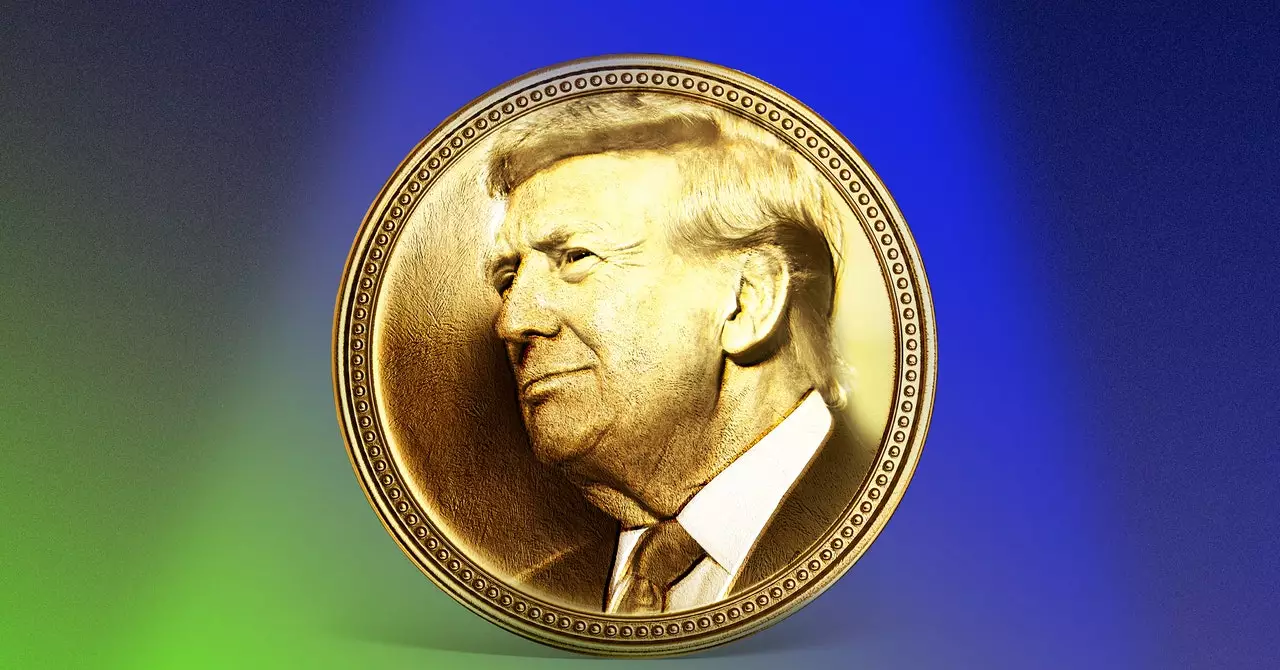The landscape of cryptocurrency has witnessed drastic changes over the past few years, with figures like former President Donald Trump recently entering the fray. Initially dismissive of bitcoin, labeling it a “scam,” Trump’s recent pivot to embrace digital currencies has raised eyebrows and sparked intrigue. This article delves into the nuances of Trump’s evolving relationship with cryptocurrency, the implications of his potential re-election for the crypto market, and the challenges awaiting his new venture in this crowded field.
In a striking turn of events, Donald Trump has publicly positioned himself as a proponent of cryptocurrency, asserting that he would transform the United States into the “crypto capital of the planet” if re-elected. Speaking at a large gathering of cryptocurrency enthusiasts in Nashville, Trump not only expressed support for digital currencies but specifically mentioned the establishment of a national “bitcoin stockpile.” This is a significant shift from his previous assertions, indicating a calculated move to align with a demographic that plays an increasingly influential role in American financial and political spheres.
This newfound enthusiasm for cryptocurrency was met with cheers from attendees, including influential figures like Tyler Winklevoss, who remarked that Trump had been “orange-pilled”—a term describing someone who has embraced the ethos of bitcoin. This shows a remarkable transformation in Trump’s perceived relationship with the cryptocurrency sector, demonstrating that he is willing to adapt his views to gain favor and support from a potent and passionate voter base.
The discourse surrounding Trump’s crypto endeavors has gathered momentum with the announcement of the World Liberty Financial project. Initially speculated to be linked to the creation of an official Trump cryptocurrency, World Liberty Financial is likely to enable the Trumps to capitalize on their vast media presence and engage in ventures within the decentralized finance (DeFi) space. The DeFi market is teeming with established platforms like Aave and Compound, posing significant challenges for any new entrants, including Trump’s initiative.
Despite the hurdles, Trump’s considerable public platform has the potential to significantly amplify the visibility of World Liberty Financial. Industry experts believe that the media exposure that comes with Trump’s name could provide unprecedented marketing advantages. Zach Hamilton, a prominent figure in the crypto startup scene, asserts that Trump’s presence alone could translate into major attention that many crypto firms can only dream of accessing, but one must question whether this is sufficient to ensure the platform’s genuine success in a complex market.
Trump’s alignment with the cryptocurrency sector raises questions about the broader implications for both politics and finance. The cryptocurrency sphere has often been viewed as a commodity of choice for right-wing ideologies, and Trump’s burgeoning relationship with digital currencies appears to reinforce this narrative. As Jacob Silverman, co-author of “Easy Money,” points out, cryptocurrency has increasingly been associated with Republican financial interests, shaping its identity as a right-leaning asset class.
This evolution indicates a time of transformation where the crypto world could serve as a launchpad for political survival or resurgence. The World Liberty Financial initiative might serve as a strategic fallback for Trump should the 2024 elections not go in his favor, creating a potential safety net built on his cryptocurrency endeavors.
While the prospects of World Liberty Financial appear promising, it is essential to recognize the inherent risks involved in launching a new cryptocurrency platform without established credibility. Industry veterans express cautious optimism, acknowledging the publicity that Trump’s entry into the sector could generate, yet they simultaneously caution against potential reputational pitfalls. Brad Harrison, CEO of Venus Protocol, showcases the dichotomy of enthusiasm and apprehension within the existing DeFi community regarding the ramifications of a new entrant that may not adhere to the industry’s complexity and rigor.
Although Trump’s foray into cryptocurrency could connect with many politically motivated consumers, it raises significant questions about the future of digital currencies and their intersection with politics. As the market faces ongoing developments, it becomes crucial for investors and enthusiasts alike to tread carefully, balancing their visionary hopes for cryptocurrency with the complexities and potential volatility of the political landscape.
Trump’s shift toward embracing cryptocurrency represents a watershed moment not just for himself but for the broader narrative of financial innovation interwoven with political ambition. As the crypto community watches closely, the ultimate success of this initiative will hinge on its ability to navigate the intricate challenges of an already competitive landscape while remaining true to the principles that have defined the cryptocurrency ethos.

